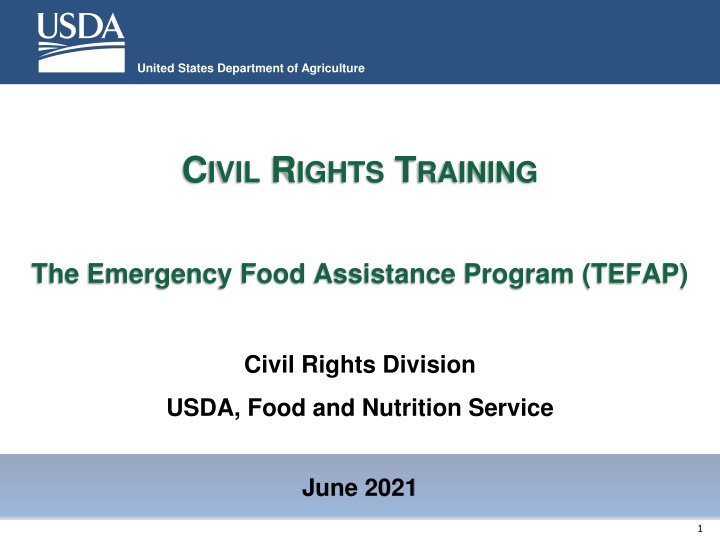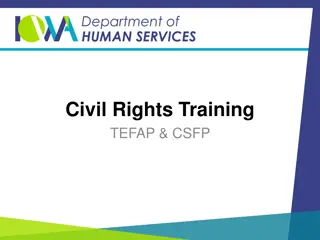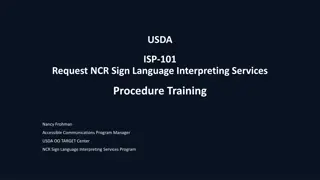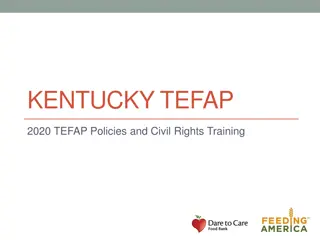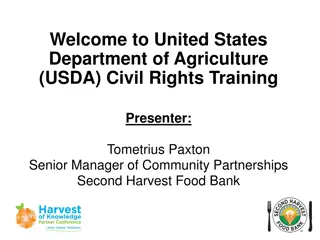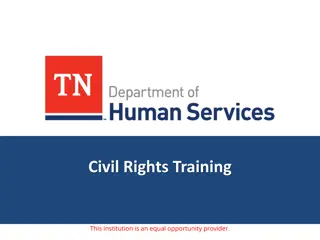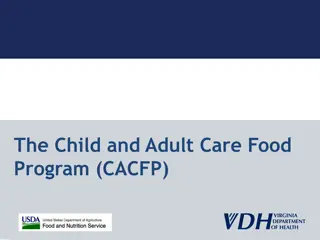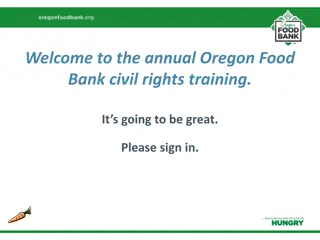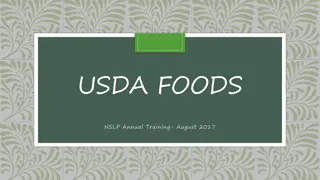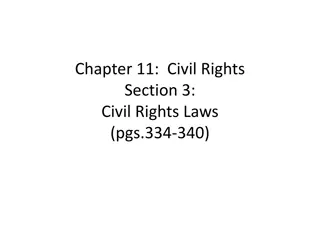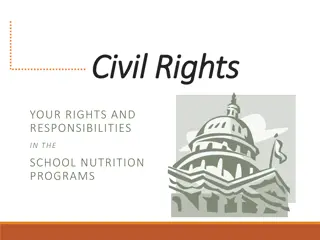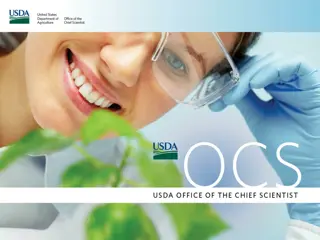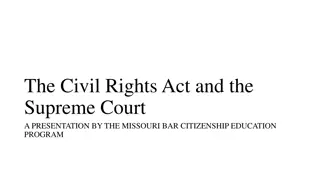USDA Civil Rights Training for TEFAP Program
The USDA Civil Rights Training emphasizes the importance of training for state agencies, subrecipient agencies, frontline staff, and volunteers involved in the Emergency Food Assistance Program (TEFAP). It covers various aspects of Civil Rights compliance, including public notification, complaint procedures, disability accommodations, language assistance, conflict resolution, and customer service. The program also outlines legal authorities such as Title VI of the Civil Rights Act and Section 504 of the Rehabilitation Act to ensure non-discrimination in program activities.
Download Presentation

Please find below an Image/Link to download the presentation.
The content on the website is provided AS IS for your information and personal use only. It may not be sold, licensed, or shared on other websites without obtaining consent from the author.If you encounter any issues during the download, it is possible that the publisher has removed the file from their server.
You are allowed to download the files provided on this website for personal or commercial use, subject to the condition that they are used lawfully. All files are the property of their respective owners.
The content on the website is provided AS IS for your information and personal use only. It may not be sold, licensed, or shared on other websites without obtaining consent from the author.
E N D
Presentation Transcript
United States Department of Agriculture CIVIL RIGHTS TRAINING The Emergency Food Assistance Program (TEFAP) Civil Rights Division USDA, Food and Nutrition Service June 2021 1
United States Department of Agriculture United States Department of Agriculture Civil Rights Training State agencies are responsible for training subrecipient agencies on an annual basis. Subrecipient agencies are responsible for training their local sites, including frontline staff who interact with applicants or participants on an annual basis. New employees before participating in Program activities must receive training. Volunteers must receive training appropriate to their roles and responsibilities. 2
Front line - regular Front line - occasional
United States Department of Agriculture Civil Rights Training All staff should receive training on all aspects of Civil Rights compliance, including, but not limited to: Effective public notification system Complaint procedures Compliance review techniques Resolution of noncompliance Requirements for reasonable modifications for persons with disabilities Requirements for language assistance Conflict resolution Customer service
United States Department of Agriculture Agenda Civil Rights Coverage and Legal Authorities Areas of Compliance Assurances Public Notification Limited English Proficiency (LEP) Disability Discrimination Equal Opportunity for Religious Organizations Civil Rights Training Complaints of Discrimination Compliance Reviews Resolution of Noncompliance Questions
United States Department of Agriculture Civil Rights Legal Authorities Title VI of the Civil Rights Act of 1964 Race, Color, and National Origin Civil Rights Restoration Act of 1987 Clarifies the scope of the Civil Rights Act of 1964 Section 504 of the Rehabilitation Act of 1973; Americans w/Disabilities Act of 1990, as amended by the Americans with Disabilities Act Amendments Act of 2008 Disability Title IX of the Education Amendments of 1972 Sex Age Discrimination Act of 1975 Age
United States Department of Agriculture Civil Rights Legal Authorities 7 CFR Part 15 Gives USDA agencies authority to develop Civil Rights requirements and prohibits discrimination in Federally assisted programs or activities 7 CFR Part 16, Equal Opportunity for Religious Organizations Gives equal footing to religiously affiliated organizations 7 CFR Parts 250 and 251 (TEFAP) Sections 4(a) and 5 of the Agriculture and Consumer Protection Act of 1973 (Public Law 93-86), as amended (CSFP)
United States Department of Agriculture Civil Rights Legal Authorities 28 CFR Part 35 Covers nondiscrimination on the basis of disability by State/local governments Executive Order 13166 - "Improving Access to Services for Persons with Limited English Proficiency" (August 11, 2000) Guidance to Federal Financial Assistance Recipients Regarding the Title VI Prohibition Against National Origin Discrimination Affecting Persons With Limited English Proficiency (79 Fed. Reg. No, 229, Friday, November 28, 2014) USDA LEP Policy Guidance
United States Department of Agriculture Civil Rights Legal Authorities USDA Departmental Regulation 4330-2 Prohibits discrimination in programs and activities funded in whole or in part by the USDA FNS Instruction 113-1 and Appendix C Provides information on Civil Rights compliance and enforcement
United States Department of Agriculture What is discrimination? Different treatment which makes a distinction of one person or a group of persons from others; either intentionally, by neglect, or by the actions or lack of actions... 1) Race 2) Color 3) National Origin 4) Age 5) Sex 6) Disability
United States Department of Agriculture Assurances To qualify for Federal financial assistance, an application must be accompanied by a written assurance that the entity to receive financial assistance will be operated in compliance with all nondiscrimination laws, regulations, instructions, policies, and guidelines. A Civil Rights assurance statement must be incorporated in all agreements between Federal and CSFP/TEFAP State agencies (FNS Form 74) CSFP/TEFAP State agencies and subrecipient agencies Subrecipient agencies and their local sites (if applicable)
United States Department of Agriculture Public Notification All FNS assistance programs must include a public notification system. The purpose of this system is to inform applicants, participants, and potentially-eligible persons of: Program Availability Program Rights and Responsibilities The Policy of Nondiscrimination The Procedure for Filing a Complaint
United States Department of Agriculture Elements of Public Notification Program Availability Inform applicants, participants, and potentially eligible persons of their program rights and responsibilities and the steps necessary for participation Complaint Information Must advise applicants and participants at the service delivery point of their right to file a complaint, how to file a complaint, and the complaint procedures Nondiscrimination Statement All information materials and sources, including websites, must contain a nondiscrimination statement. The statement is not required to be included on every page of the program website. At a minimum the nondiscrimination statement or a link to it must be included on the home page of the program information.
United States Department of Agriculture Elements of Public Notification State agencies and their subrecipients must: Make program information available to the public upon request Prominently display the And Justice for All poster Inform potentially eligible persons, applicants, participants and grassroots organizations of programs or changes in programs Convey the message of equal opportunity in all photos and other graphics that are used to provide program or program- related information Provide appropriate information in alternative formats for persons with disabilities and in the appropriate language(s) for LEP persons 11
United States Department of Agriculture Nondiscrimination Statement In accordance with Federal civil rights law and U.S. Department of Agriculture (USDA) civil rights regulations and policies, the USDA, its Agencies, offices, and employees, and institutions participating in or administering USDA programs are prohibited from discriminating based on race, color, national origin, sex, disability, age, or reprisal or retaliation for prior civil rights activity in any program or activity conducted or funded by USDA. Persons with disabilities who require alternative means of communication for program information (e.g. Braille, large print, audiotape, American Sign Language, etc.), should contact the Agency (State or local) where they applied for benefits. Individuals who are deaf, hard of hearing or have speech disabilities may contact USDA through the Federal Relay Service at (800) 877-8339. Additionally, program information may be made available in languages other than English. To file a program complaint of discrimination, complete the USDA Program Discrimination Complaint Form, (AD-3027) found online at: http://www.ascr.usda.gov/complaint_filing_cust.html, and at any USDA office, or write a letter addressed to USDA and provide in the letter all of the information requested in the form. To request a copy of the complaint form, call (866) 632-9992. Submit your completed form or letter to USDA by: (1) mail: U.S. Department ofAgriculture Office of the Assistant Secretary for Civil Rights 1400 Independence Avenue, SW Washington, D.C. 20250-9410; (2) fax: (202) 690-7442; or (3) email: program.intake@usda.gov. This institution is an equal opportunity provider.
United States Department of Agriculture Nondiscrimination Statement (Spanish) De conformidad con la Ley Federal de Derechos Civiles y los reglamentos y pol ticas de derechos civiles del Departamento de Agricultura de los EE. UU. (USDA, por sus siglas en ingl s), se proh be que el USDA, sus agencias, oficinas, empleados e instituciones que participan o administran programas del USDA discriminen sobre la base de raza, color, nacionalidad, sexo, discapacidad, edad, o en represalia o venganza por actividades previas de derechos civiles en alg n programa o actividad realizados o financiados por el USDA. Las personas con discapacidades que necesiten medios alternativos para la comunicaci n de la informaci n del programa (por ejemplo, sistema Braille, letras grandes, cintas de audio, lenguaje de se as americano, etc.), deben ponerse en contacto con la agencia (estatal o local) en la que solicitaron los beneficios. Las personas sordas, con dificultades de audici n o discapacidades del habla pueden comunicarse con el USDA por medio del Federal Relay Service [Servicio Federal de Retransmisi n] al (800) 877- 8339. Adem s, la informaci n del programa se puede proporcionar en otros idiomas. Para presentar una denuncia de discriminaci n, complete el Formulario de Denuncia de Discriminaci n del Programa del USDA, (AD-3027) que est disponible en l nea en: http://www.ascr.usda.gov/complaint_filing_cust.html y en cualquier oficina del USDA, o bien escriba una carta dirigida al USDA e incluya en la carta toda la informaci n solicitada en el formulario. Para solicitar una copia del formulario de denuncia, llame al (866) 632-9992. Haga llegar su formulario lleno o carta al USDA por: (1) correo: U.S. Department of Agriculture Office of the Assistant Secretary for Civil Rights 1400 Independence Avenue, SW Washington, D.C. 20250-9410; (2) fax: (202) 690-7442; o (3) correo electr nico: program.intake@usda.gov. Esta instituci n es un proveedor que ofrece igualdad de oportunidades.
United States Department of Agriculture Nondiscrimination Statement USDA Nondiscrimination Statement (NDS) Short versions This institution is an equal opportunity provider. Esta instituci n es un proveedor que ofrece igualdad de oportunidades. (Spanish) *Can be used in special circumstances only Translations 22 Non-English Languages at: https://www.fns.usda.gov/fns-nondiscrimination-statement
United States Department of Agriculture And Justice For All Poster Display the poster in a prominent location for all to view AD-475A New required version for CSFP and TEFAP
United States Department of Agriculture LEP Requirements Title VI and its implementing regulations, Executive Order 13166, and USDA LEP guidance require Federal agencies and recipients (State agencies, local agencies, or other subrecipients), to take reasonable steps to ensure meaningful access to their programs and activities by Limited English Proficient (LEP) persons. (FNS Instruction 113-1, Section VII)
United States Department of Agriculture LEP Requirements Who are persons with LEP? Individuals who do not speak English as their primary language and who have a limited ability to read, speak, write, or understand English because of their national origin
United States Department of Agriculture What is Meaningful Access? Meaningful access is accomplished by providing competent, accurate, timely and effective language services at no charge to individuals with LEP when accessing recipient programs and activities. Failure to provide meaningful access to persons with LEP could be discrimination on the basis of national origin.
United States Department of Agriculture LEP and Program Access Factors to consider in when ensuring meaningful access: Number or proportion of LEP persons eligible to be served or likely to be encountered within the area serviced by the recipient Frequency with which LEP individuals come in contact with the program Nature and importance of the program, activity, or service provided by the program Resources available and their costs
United States Department of Agriculture LEP and Program Access State agencies must conduct assessments to determine language profile for their State, taking into account regional differences and updating as appropriate. Translation of vital documents is required. Oral translations and notification of free interpretation services is required. Staff training regarding how to provide LEP populations with meaningful access is paramount (frontline staff).
United States Department of Agriculture LEP and Program Access Language services: Applicants and participants cannot be asked to bring their own interpreters Children should not be used as interpreters Use qualified, competent language resources Examples of language services: Qualified, competent bilingual staff Telephone interpreter lines Oral interpretation services Written language services Qualified, competent community organizations and volunteers
United States Department of Agriculture LEP Population and Data Sources Population data sources: Department of Justice site: LEP.GOV http://www.lep.gov/maps/ US Census Data http://www.census.gov/2010census/data/ American Community Survey http://www.census.gov/acs/ Migration Policy Institute s National Center on Immigrant Integration Policy http://www.migrationpolicy.org/
United States Department of Agriculture Disability Discrimination What is the definition of disability? A person who has a physical or mental impairment which substantially limits one or more major life activities, has a record of such an impairment, or is regarded as having such an impairment. Major life activity means functions such as caring for one s self, performing manual tasks, walking, seeing, hearing, speaking, breathing, learning and working. Functions of the immune system, normal cell growth, digestive, bowel, bladder, neurological, brain, respiratory, circulatory, cardiovascular, endocrine, and reproductive functions. (ADA Amendments Act of 2008)
United States Department of Agriculture Disability Discrimination Section 504 states that no otherwise qualified individual with a disability in the United States shall solely by reason of his or her disability, be excluded from, denied the benefits of, or be subjected to discrimination under any program or activity that either receives Federal financial assistance or is conducted by any Executive agency or the United States Postal Service. The ADA has similar nondiscrimination requirements that prohibit discrimination on the basis of disability in services, programs, and activities provided by State and local government entities.
United States Department of Agriculture Disability Discrimination There is an obligation to ensure that members of the public are provided reasonable modifications in order to access program information, applications and assistance (i.e. Braille, large print, and audio tape). Providing qualified sign language interpreters or other auxiliary aids and services for persons with hearing disabilities may be necessary to effectively communicate with these applicants and participants.
United States Department of Agriculture Disability Discrimination As programs and offices modernize, it is imperative that websites, including State and local agency websites, and online application systems are readily accessible to and useable by persons with visual impairments and other disabilities. In addition, programs must ensure physical accessibility for buildings and facilities, particularly to persons in wheelchairs and with mobility disabilities. Programs must permit service animals to accompany people with disabilities in all areas where the public is allowed to go.
United States Department of Agriculture Equal Opportunity for Religious Organizations 7 CFR Part 16 Ensures a level playing field for the participation of faith-based organizations and other community organizations in USDA programs.
United States Department of Agriculture Complaints of Discrimination Complaints must be filed within 180 days from the alleged act of discrimination, with exceptions. Complaints may be written, verbal, or anonymous. State agencies or subrecipient agencies may develop their own complaint forms, but the use of such forms cannot be a pre- requisite for acceptance. A separate Civil Rights complaint log shall maintained by the State & subrecipient agency; Confidentiality is extremely important and must be maintained.
United States Department of Agriculture Complaints of Discrimination Complaints based on Complaints based on all all protected bases protected bases Must be forwarded to FNS Civil Rights Division within 5 calendar days. USDA discrimination complaint form English http://www.ocio.usda.gov/sites/default/files/docs/2012/Co mplain_combined_6_8_12.pdf Spanish http://www.ocio.usda.gov/sites/default/files/docs/2012/Spa nish_Form_508_Compliant_6_8_12_0.pdf
United States Department of Agriculture Compliance Reviews Examine the activities of State agencies, subrecipients, and local sites to determine Civil Rights compliance. FNS Civil Rights and Program staff review State agencies. State agencies review their subrecipients. Subrecipients review their local agencies. Significant findings must be provided in writing to the reviewed entity and to FNS.
United States Department of Agriculture Compliance Reviews There are three types of compliance reviews: Pre-Award Compliance Reviews Routine (Post-Award) Compliance Reviews Special Compliance Reviews
United States Department of Agriculture Pre-Award Compliance Reviews State agencies, subrecipient agencies, and local sites must be in compliance with Civil Rights requirements prior to approval for Federal financial assistance.
United States Department of Agriculture Routine/Post-Award Reviews FNS and State agencies must conduct routine compliance reviews as identified by FNS Instruction 113-1 and program-specific regulations and policies. Assess all of the Civil Rights compliance areas. Sample post-award review questions: Do printed materials contain the nondiscrimination statement? Is the And Justice For All poster displayed appropriately? Are program informational materials available to all? How are applicants and participants advised of their right to file a Civil Rights complaint of discrimination? Are reasonable modifications appropriately made for people with disabilities?
United States Department of Agriculture Special Compliance Reviews May be scheduled or unscheduled To follow-up on previous findings of noncompliance To investigate reports of noncompliance by other agencies, media, or grassroots organizations May be specific to an incident or policy History of statistical underrepresentation of particular group(s) Pattern of complaints of discrimination
United States Department of Agriculture Resolution of Noncompliance A factual finding that any civil rights requirement, as provided by law, regulation, policy, instruction, or guidelines, is not being adhered to by a State agency, subrecipient agency, or a local site. Steps must be taken immediately to obtain voluntary compliance. A finding s effective date is the date of notice to the reviewed entity.
United States Department of Agriculture Customer Service Making a difference Treat all people with dignity and respect Answer questions in a voice that is non-threatening Clearly explain to everyone the rules as well as their rights and responsibilities Recognize when stress creates a problem in giving excellent service Recognize that participants have varied needs and (sometimes) few resources Notice when a person feels that they have been treated in a rude manner Develop good listening skills
United States Department of Agriculture Conflict Resolution How is your attitude? Always clearly introduce yourself when answering the telephone and do not interrupt the caller. Be patient. Give the client every opportunity to explain the issue. Be understanding. Of all the communications situations that you encounter, angry clients require the most empathy. Do not be judgmental. Talk calmly and slowly; in a well-modulated voice (low pitch). This should help relax the person and allow you to address the facts, not cater to emotions. Be sincere. Even if you sense that the problem is not the fault of your organization and clearly not your fault, it is ok to apologize to the client for his or her inconvenience; not necessarily the actions by your agency. Be aware. Get help if threatened or if violence is possible.
United States Department of Agriculture Conflict Resolution What Steps do you need to take? Remain calm What is the problem? Using information provided, determine what the issue is Determine a solution. Know your organization s policy on handling situations and information needed to offer a solution Gain approval from the client. Check with the client for their approval on a solution Make an agreement. You and the client should determine what is to be done, when it is to be done, and by whom and alternatives if needed. Follow up. Personally make sure that the client has been satisfied, and provide feedback.
United States Department of Agriculture Customer Service Service is Effectively communicating with customers, Responding to their needs, Valuing their worth, and Instilling excellence through Courtesy, confidence, and Enthusiasm.
United States Department of Agriculture Conflict Resolution IDENTIFY THE PROBLEM. Identify the problem based on the information the customer gives you. DETERMINE A SOLUTION. Depending on the specifics of the conversation and your knowledge of your organization, the solution may involve calling the customer again. GAIN APPROVAL FROM THE CUSTOMER. If the customer does not agree to the proposed solution, it will resolve nothing! MAKE AN AGREEMENT. You and the customer should determine what is to be done, when it is to be done, and by whom. If it is not possible, suggest an alternative. FOLLOW UP. Personally make sure that the customer has been satisfied; and provide feedback.
United States Department of Agriculture Questions
United States Department of Agriculture Contact Information Michele Sazo USDA, Food and Nutrition Service Mid-Atlantic Regional Civil Rights Director Telephone: (609) 259-5061 Email: michele.sazo@fns.usda.gov 48
